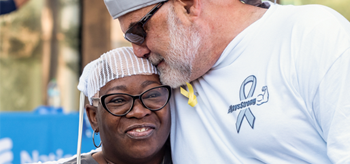Grant to UCLA researchers will validate an imaging-based clinical trial endpoint to better enable decision-making in brain tumor drug development
Today, the National Brain Tumor Society (NBTS), the nation’s largest nonprofit dedicated to defeating brain tumors and improving the lives of patients with brain tumors, and The Sontag Foundation, one of the largest private funders of brain cancer research, announced a grant to Drs. Timothy Cloughesy and Benjamin Ellingson of the University of California, Los Angeles to establish a new imaging-based endpoint that could be used to better determine the efficacy of investigational therapies in clinical trials for brain cancer patients.
The grant, titled “Validation of a New Imaging Endpoint of Therapeutic Activity for Early Phase Clinical Trials in Brain Tumors,” will allow Drs. Cloughesy and Ellingson to perform both a retrospective natural history study and prospective validation study to establish whether the addition of a “hyperacute” baseline MRI scan taken within 1-2 days prior to a patient starting an investigational treatment can better predict tumor response than current paradigms.
“As patient advocates, it’s been beyond frustrating to see so many late-stage clinical trials end in failure for glioblastoma patients,” said NBTS Chief Executive Officer, David Arons. “As a field, we need to do better to ensure large, phase II and III studies enrolling significant numbers of patient volunteers have higher degrees of confidence that the drug being evaluated is having a clinically meaningful benefit — meaningful improvement on how a patient feels, functions, or survives. This project, emerging from years of work in the NBTS Imaging Working Group, is exciting because, if successful, it may allow for a new way to measure treatment effect early in the clinical trials process, saving time, money, and potentially lives.”
Imaging response assessment is a cornerstone of patient care and drug development in oncology. Clinical researchers rely on tumor imaging to estimate the impact of new treatments and to guide decision making for patients and investigational therapies. However, Drs. Cloughesy and Ellingson recently analyzed data from a trial of recurrent glioblastoma patients and found that 67% of patients who received a typical baseline MRI scan (an average of approximately 13 days prior to start of treatment) would have recorded a greater than 40% increase in tumor volume by the first post-treatment follow up exam. However, when an immediate pretreatment MRI (1-2 days prior to start of treatments) was used as a baseline, only 17% showed growth over 40% at the first follow-up exam. Without obtaining a hyperacute baseline 1-2 days prior to the start of treatment, the majority of patients in this study would have exhibited radiographic progression after the first 28 days of treatment. These results suggest that a new baseline ultimately provides a better understanding of the true impact of the study drug on tumor growth. This raises the question of whether some clinical trials could miss clinical effects of an investigational drug due to the delay between the baseline scan and the start of treatment.
Validation of the new imaging-based endpoint therefore could be important to guide brain tumor drug development from early to later stages through the use of an additional hyperacute baseline scan that can more directly attribute any change in tumor growth rate to the therapy under examination. This updated approach to imaging-based tumor response assessment is intended to improve the ability to select candidate therapies for later-stage development, including those that may not meet current thresholds for “response,” and ultimately lead to identification of effective treatments. The hope is that if the new endpoint of change in tumor growth trajectory is sufficiently validated, it could provide a reliable surrogate for clinical benefit and encourage FDA designations from Fast Track up to Accelerate Approval, depending on the level of evidence.
“We are thrilled to partner with the National Brain Tumor Society to help fund this critical research,” said Hilary Keeley, Executive Director of the Sontag Foundation. “We look forward to seeing the results of this project and are hopeful that this research will help to improve the clinical trials process and accelerate treatment options for brain tumor patients.”
About the National Brain Tumor Society
Building on over 30 years of experience, the National Brain Tumor Society (NBTS) unrelentingly invests in, mobilizes, and unites the brain tumor community to discover a cure, deliver effective treatments, and advocate for patients and caregivers. Our focus on defeating brain tumors and improving the quality of patients’ lives is powered by our partnerships across science, health care, policy, and business sectors. We fund treatments-focused research and convene those most critical to curing brain tumors– once and for all. Join us at BrainTumor.org.
About The Sontag Foundation
The Sontag Foundation is one of the largest private funders of brain cancer research, providing over $50 million dollars since its inception in 2002. Its signature Distinguished Scientist Award has supported 61 researchers at 38 major academic institutions. Grantees include researchers and physician-scientists spanning fields from developmental biology to chemical engineering, with a wide-range of expertise including computational biology, single cell genomics and metabolomics. The Sontag Foundation is also the founding sponsor of the Brain Tumor Network, a nonprofit provider of personalized brain tumor patient navigation services. www.SontagFoundation.org.



